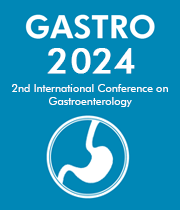Title : Preliminary result from a prospective single-center randomized controlled study of No.6 lymph node dissection in improving the positive rate of lymph nodes in laparoscopic hepatic flexure of colon cancer
Abstract:
D3 lymphadenectomy and Complete Mesocolic Excision (CME) are standard treatment for right colon cancer. Colon cancer of hepatic flexure is likely to have metastasis of the infrapyloric lymph nodes (No. 206), which are not regional Lymph Nodes (LN). LN dissection of No.206 group belongs to extended right hemicolectomy. The survival benefits of extended right hemicolectomy are not supported by high?level evidence. It is still controversial whether the infrapyloric LN dissection should become routine for colon cancer of hepatic flexure. Based on the above reasons, we conducted a prospective single center randomized controlled study on the effect of No. 206 LN dissection on improving the detection rate of LN in laparoscopic colorectal cancer surgery.
Methods:
-
Objective: To investigate the clinical value of No. 206 LN dissection in patient undergone right hemicolectomy with a prospective single center randomized controlled design of experiment
-
Patients: Patients undergone right hemicolectomy.
-
Enrolled patients: 11 in the experimental group.
-
Surgery: The experimental group underwent laparoscopic extended right hemicolectomy, analyzed the metastasis rate of No. 206 LN in different stages, and recorded perioperative complications.
-
Main research endpoint: positive detection rate of No. 206 LN at different pathological stages.
-
Secondary endpoint: postoperative recovery of gastrointestinal function, lymphatic leakage.
-
Our institutional review board approved this procedure. All patients provided written informed consent before undergoing surgery. This study is registered in Chinese Clinical Trial Registry (ChiCTR2200056620).
Results:
From October 2022 to August 2023, a total of 11 patients underwent extended right hemicolectomy were enrolled in the study. The data of these 11 patients is shown in Table 1. These cancers were in the hepatic flexure of colon in 8 cases and in the transverse colon in 3 cases. There were 7 male and 4 female patients enrolled, with a median age of 68 years (range, 42–93 years). None of the patients enrolled in experimental group had No. 206 LN metastasis. The average value of total lymph node dissection is 30. No postoperative complications occurred in 11 cases.
Conclusion:
None of the patients had No. 206 lymph node metastasis. It may be related to the small sample of patients included. One limitation of this study was the lack of a long-term follow-up in which to evaluate survival rates and disease-free survival after radical oncological dissection. Furthermore, the single-center and small sample size can also be considered a limitation.



